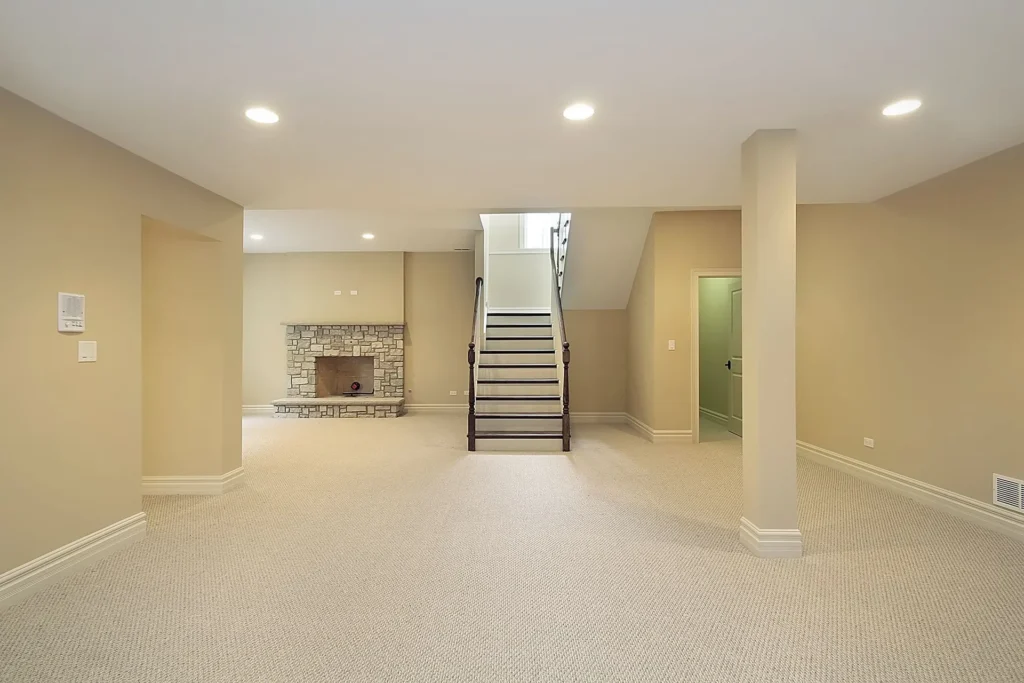According to the Remodeling Impact Report, homeowners who finish their basements can expect to recoup up to 86% of the total costs at resale.
Unfortunately, the number one threat to any basement, especially a finished basement, is water.
Counties like Morris, Passaic, Sussex, and the rest of North Jersey are not strangers to flooding after Hurricane Ida a few years ago, but you don’t need to be in a flood zone to experience water damage in your basement.
While waterproofing is important for any basement in New Jersey, it’s especially important if you’ve invested time and money into finishing your basement.

Water exposure to drywall and furniture can wreak havoc on your basement, leading to structural and health concerns. Here are a few reasons to invest in waterproofing before or after finishing your basement.
The average cost to finish or remodel a New Jersey basement ranges from $40,000 to $145,000. Protect your investment with waterproofing services that help eliminate moisture contact with drywall or flooding.
Basements should feel just as dry and comfortable as the rest of your house. Waterproofing reduces dampness, musty odors, and condensation that can make the space uninviting or even uninhabitable, especially during the summer.
Moisture creates an ideal environment for mold growth, often hidden behind walls or beneath flooring. Mold not only damages materials but also reduces indoor air quality, triggering allergies, asthma, and respiratory issues.
Waterproofing reduces the risk of mold from moisture contact, although you may need to invest in ventilation if you’re experiencing high humidity in the summer.
Water can weaken foundation walls, erode mortar, and cause concrete to crack. Waterproofing protects the structural integrity of the home as well as the finished living space.
In most cases, your waterproofing services company will offer foundation repairs to prevent leaks and moisture intrusion as part of your service package.
Understanding how water enters a basement helps determine the right waterproofing strategy. The most common causes of water intrusion in New Jersey basements include:
When discussing waterproofing services with a contractor, it’s important to note that your contractor may offer several different types of waterproofing. Understanding these services and their advantages can help you find the best contractor for your waterproofing needs.
Interior systems manage water once it has entered the basement. Here’s how they work in real-time:
Exterior systems stop water before it enters the basement, providing long-term protection but requiring more labor.
Even small hairline cracks can allow water intrusion. Therefore, it’s essential to repair foundation walls and seal gaps to prevent further intrusion. Different repair methods include:
Review your options with different contractors to find the best solution for you. It will often require different approaches to find one that best suits your home’s needs.
Beyond waterproofing systems, homeowners can reduce the risk of damaging their finished basement with proactive measures:
These helpful preventative tips will help keep moisture away from your basement in areas your waterproofing system may not handle, while also extending the longevity of your waterproofing system.
Yes. Waterproofing should always be completed before finishing to prevent hidden water damage behind walls and under flooring. It’s always more cost-effective to be proactive than reactive.
Some interior solutions, like sump pumps and dehumidifiers, can be added without major disruption. However, significant water problems often require removing drywall or flooring to access the foundation.
Exterior waterproofing membranes are only guaranteed to last for 7 years because they are vulnerable to the elements, such as tree roots, soil erosion, and wildlife that can damage systems.
Interior systems, on the other hand, can last much longer with the proper contractor and installation. United Waterproofing’s systems are guaranteed to last decades longer due to their durable design.